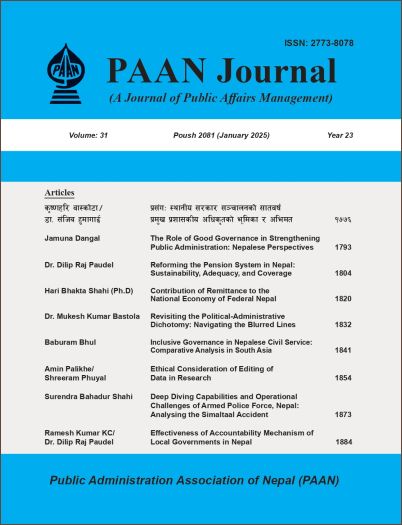Inclusive Governance in Nepalese Civil Service: A Comparative Study in South Asia
DOI:
https://doi.org/10.3126/paanj.v31i01.73611Keywords:
Governance, Inclusion policies, Civil Service, South Asia, NepalAbstract
Purpose - This paper examines the landscape of inclusive governance in the civil service of Nepal, utilizing comparative analysis with other South Asian countries. Through a systematic analysis of policies, practices, and outcomes, the paper seeks to identify key factors influencing inclusive governance and to offer insights into potential strategies for improvement.
Methodology - To fulfil the purpose of this paper based on a quantitative descriptive approach by reviewing existing literature and using secondary data and information provided by the World Bank and the United Nations Development Programme (UNDP). Various articles in the field of inclusive governance were collected and published between 2000 and 2023.
Findings/Results - In terms of inclusive governance, Nepal has been adopted since 2007, after the second amendment of the Civil Service Act, 1993 to bring the disadvantaged groups such as women, and other minorities, who are socially, economically and politically marginalized into the governing system. Until 2023, only 27% of Nepal's public sector employees are women, with men making up the remaining 73% (NIC, 2022). According to data, the government service employs up to 63.50% Khas/Aryas, but only 0.60% Muslims, 2.50% Dalits, 15.40% Madhesis, and 19.5% Indigenous people are represented (Bhul, 2021). Comparative research reveals a fundamental issue with inclusive governance in South Asia, emphasizing considerable gaps in the representation of women and minority groups across the region. While Bangladesh leads in female representation and Sri Lanka in minority representation, inequities continue, emphasizing the importance of specific initiatives to promote diversity. Nepal faces challenges when transforming legal mandates into real results, widening the gap between policy goals and actual successes in inclusive governance. Corruption remains a major obstacle to governance and social integration across South Asia where Bhutan rating highest and Afghanistan ranking lowest.
Originality/value - This paper is a unique effort to review the state of inclusive governance initiative experiences in the field of civil service in South Asia and Nepal.




